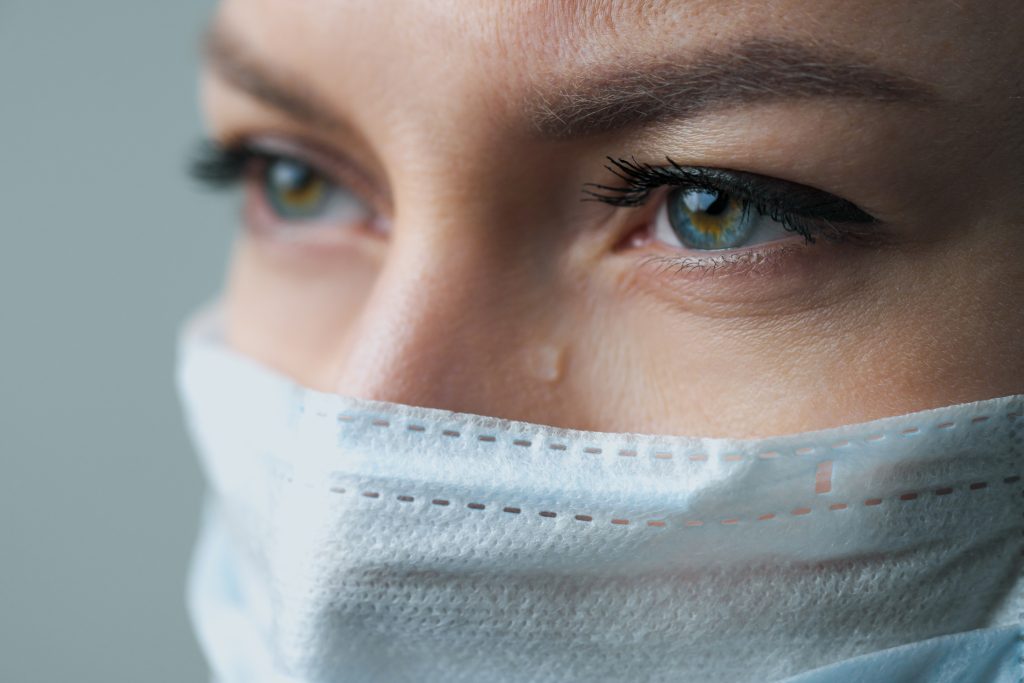
Mental Health of Healthcare Workers Has Tanked Amid Pandemic
The COVID-19 pandemic is clearly taking a toll on the mental health of our nation’s healthcare workers, according to the findings of our survey on mental health on the frontlines.
The results, which appear to echo findings regarding the mental health of medical personnel on China’s frontlines, show a sharp decline in perceived mental health, as well as a sizable uptick in perceived work-related stress, in the wake of the COVID-19 pandemic.
The survey, which saw responses from physicians, registered nurses, advanced practitioners, respiratory therapists, and more, asked healthcare professionals on the frontlines to rate their current mental health, as well as their mental health prior to the COVID-19 pandemic. On average, prior to the pandemic, respondents ranked their mental health as a 7.88 out of 10, with 1 being very poor and 10 being excellent. 5.44 out of 10 is how the same respondents rank their current mental health.
Respondents also expressed a negative view of their employers, with the average response mostly unfavorable (4.42/10) when asked how important they feel their mental health is to their employers.
The results were as follows, including select quotes from respondents.
On a scale from 1 to 10, with 1 being very poor and 10 being excellent, how would you rate your mental health prior to the COVID-19 pandemic?
Average Answer: 7.88/10
On a scale from 1 to 10, with 1 being very poor and 10 being excellent, how would you rate your current mental health?
Average Answer: 5.44/10
On a scale from 1 to 10, with 1 being very low and 10 being very high, how would you rate your level of work-related stress prior to the COVID-19 pandemic?
Average Answer: 6.08/10
On a scale from 1 to 10, with 1 being very low and 10 being very high, how would you rate your current level of work-related stress?
Average Answer: 8.15/10
On a scale from 1 to 10, with 1 being very poor and 10 being excellent, how well do you believe you are coping with your work-related stress?
Average Answer: 6.17/10
Most Commonly Used Coping Mechanisms:
1. Physical Activity
2. Humor
2. Talking to Family/Friends
3. Avoidance
4. Prescription Medication
5. Other
6. Yoga/Meditation
7. Alcohol
8. Therapy
9. Recreational Drugs
On a scale from 1 to 10, with 1 being very little and 10 being very much, how much do you feel your job negatively impacts your mental health?
Average Answer: 7.6/10
On a scale from 1 to 10, with 1 being very little and 10 being very much, how much do you feel the COVID-19 pandemic has worsened your mental health?
Average Answer: 7.4/10
On a scale from 1 to 10, with 1 being very little and 10 being very much, how important do you feel your mental health is to your employer?
Average Answer: 4.42/10
Is there anything else you would like to tell us regarding mental health and frontline medical workers?
“We need help. We aren’t getting it. I feel hopeless and like death is around every corner.”
“It is very stressful and depressing to work for months wearing masks, gowns and gloves and still try to deliver compassionate, effective, efficient, and personable care. No one cares about the staff’s mental health at all.”
“It’s fear of the unknown. There’s so much we don’t know about this virus—that’s frightening at times.”
“As a parent of three children dealing with the stress of bringing home COVID to my family and having no time to myself, having to do home schooling on my days off, has definitely made it exhausting and extremely high stress.”
“Essential or sacrificial?”
“You must to take care of yourself first in order to take care of anyone else, which includes your mental health. I really never understood this until the pandemic started to take its toll.”
“We mostly hear about doctors and nurses in the hospital, but therapists/dietitians/CNAs/dietary/housekeeping are also hit hard, ESPECIALLY in nursing homes because these residents are like family. Watching dozens of your “family members” die in a month is traumatizing. The first few you sob and sob, then you become numb to it, because it’s all you can do to keep going. If you cry over every death, there’ll be nothing left of you. But we don’t get the support we need to keep going. We’re treated like machines, expected to keep going, spend more and more hours and work to make sure we’re ready for a state infection control survey. We’re tired. I’m tired. I can’t handle a second wave.”
Prior to the pandemic, multiple occupations within the field were already considered high stress and the suicide risk was identified as being higher among nurses than any other profession, making the findings especially alarming. With experts predicting an escalating mental health crisis for Americans as a whole, it is especially important for healthcare professionals to be aware of their mental health, and to seek help as needed.
If you are struggling with your mental health, we urge you to ask for help. You are just a call or text away from reaching professionals who can assist you in processing what you are experiencing. Reach out to them, if you need support at:
- Substance Abuse and Mental Health Services Administration’s (SAMHSA’s) Disaster Distress Hotline: Call 1-800-985-5990 or text TalkWithUs to 66746.
- The Crisis Text Line: Text TALK to 741741.
- National Suicide Prevention Lifeline: Call 1-800-273-TALK.
Disclaimer: The viewpoint expressed in this article is the opinion of the author and is not necessarily the viewpoint of the owners or employees at Healthcare Staffing Innovations, LLC.
